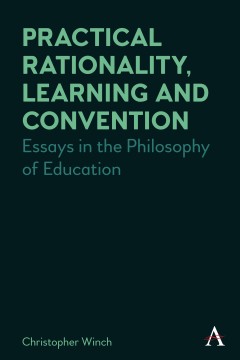Practical Rationality, Learning and Convention
Essays in the Philosophy of Education
By Christopher Winch
Other Formats Available:
- About This Book
- Reviews
- Author Information
- Series
- Table of Contents
- Links
- Podcasts
About This Book
The proposed volume covers Christopher Winch’s work over a period of 37 years and illustrates four interconnected themes that have informed his thinking over that period. Writing from a Wittgensteinian perspective, Winch is primarily interested in applying Wittgenstein’s general approach to philosophising to educational problems and puzzles of a variety of different kinds. Throughout the collection there is an emphasis on the complexity and subtlety of many of the philosophical problems associated with education, the importance of appreciating differences and the contestability of many educational judgements. Thus the volume starts with a section on rationality and argument and a discussion of some of the perplexities about the nature of literacy and whether it represents a cognitive ‘leap forward’ for the human race or whether it is more of an enabling technology. It is followed, in a reply to David Cooper, by an article that emphasises the importance of charitable interpretation in understanding reasoning and looks at some of the difficulties involved in understanding reasoning in informal contexts.
Winch’s interest in rule-following and concept formation is the theme of the next few articles. Winch has long been interested in philosophical aspects of professional action and judgement. The third section of this book focuses on that preoccupation. Gilbert Ryle’s ideas as well as Wittgenstein’s have been a significant influence on this. This section closes with a discussion of the sense we can make of the claim that theoretical knowledge can inform agency in professional contexts. The fourth section gathers together seven papers on learning and training that Winch has published over the last 25 years. The overarching theme of this section is the highly variegated nature of the phenomena of learning and the difficulty of constructing a ‘grand theory’ of learning.
Reviews
Overall, the essays in this book are characterized by a high level of scholarship and pedagogical relevance for researchers in the field of Wittgenstein studies and philosophy of education. It will be a worthwhile read especially for those who want to rediscover the study of Wittgenstein in a way that is not so self-absorbed in the exegetical debates around his life and work. Its focus on the critical application of Wittgenstein in professional and vocational education is a welcome breather that can make his philosophy more appealing to a wider audience of teachers and educators. —Lumberto Guce Mendoza, Assistant Professor of Philosophy, University of the Philippines, Philippines
Author Information
Christopher Winch is currently professor of educational philosophy and policy in the School of Education, Communication and Society at King’s College London.
Series
Anthem Studies in Wittgenstein
Table of Contents
Acknowledgements; Preface: A Brief Introduction to the Rationale for the Collection; Part I Rationality, Concepts and Conventions; Chapter One Education, Literacy and the Development of Rationality; Chapter Two Cooper, Labov, Larry and Charles; Chapter Three Do We Need Conventions?; Chapter Four Professional Education, Know- How and Conceptual Ability: The Role of Education in the Attainment of Concept Mastery in Professional Work; Part II Know-How and Vocational Education; Chapter Five Ryle on Knowing How and the Possibility of Vocational Education; Chapter Six Vocational Education, Knowing How and Intelligence Concepts; Chapter Seven Assessing Professional Know-How; Chapter Eight Education and Broad Concepts of Agency; Chapter Nine Knowing ‘Wh’ and Knowing How: Constructing Professional Curricula and Integrating Epistemic Fields; Chapter Ten Professional Knowledge, Expertise and Perceptual Ability; Chapter Eleven Applied Theoretical Knowledge and Professional and Vocational Education; Part III Learning and Training; Chapter Twelve Learning How to Learn: A Critique; Chapter Thirteen The Representational Theory of Learning and Its Pedagogic Relevance; Chapter Fourteen Curriculum Design and Epistemic Ascent; Chapter Fifteen Rousseau on Learning: A Re-Evaluation; Chapter Sixteen Learning the Virtues at Work; References; Index.
Links
Stay Updated
Information
Latest Tweets



